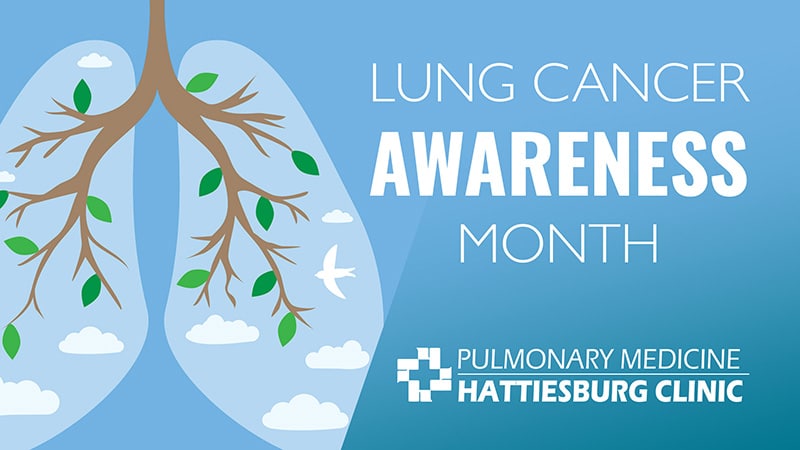Lung Cancer Awareness Month at Hattiesburg Clinic Pulmonary Medicine
Lung cancer is the leading cause of cancer deaths in America. It accounts for more deaths than colon, breast and prostate cancers combined. Research further shows that higher rates of new cases and deaths disproportionately impact Mississippians. According to the National Cancer Institute at the National Institutes of Health, early detection of lung cancer reduced deaths among study participants by 20% and helped some patients become cancer free1. November is Lung Cancer Awareness Month, and Hattiesburg Clinic Pulmonary Medicine believes awareness is the key to fighting lung cancer in Mississippi. Increased awareness can lead to significant changes in behavior and health care access, ultimately reducing the burdens of this disease.
In the state of Mississippi, between 2015 and 2019, there were 13,422 new cases of lung cancer reported, and nearly 70% of those cases were fatal. Sadly, the state has the third highest death rate and the fourth highest rate of new cases in the United States2. According to the American Cancer Society, Mississippi consistently ranks among the states with the highest lung cancer rates3. Cigarette smoking is the number one risk factor for lung cancer, and nationwide, cigarette smoking is responsible for 80% to 90% of deaths. Other risk factors include, secondhand smoke, exposure to radon, asbestos, uranium, arsenic and diesel exhaust2. Additionally, socioeconomic disparities, such as limited access to health care and a higher prevalence of smoking, also contribute to higher rates in our state.
This disease impacts a wide variety of people in Mississippi. But, while lung cancer does not discriminate, some populations are more vulnerable. Historically, men are more susceptible because of higher smoking rates than women. Rural communities with limited access to health care, preventative education and early detection services have higher rates due to late-stage diagnosis.
Wesley Aldred, MD, FACP, with Hattiesburg Clinic Pulmonary Medicine and Critical Care Medicine, said waiting for symptoms to appear is not the best approach to diagnosing this disease. The best means of reducing these distressing numbers, he said, is to be screened for lung cancer. Screening is recommended for those who:
- Are aged 50-80
- Have a smoking history equal to one pack per day for the last 20 years
- Are currently smoking or have quit within the past 15 years
“Unfortunately, symptoms from lung cancer develop late in the disease process when a cure is likely not an option. However, lung cancer screening is now available and recommended for adults who are at high risk for developing the disease because of their smoking history and age,” said Aldred. “Lung cancer screening has been shown to decrease the rates of death due to lung cancer.”
Rather than waiting for a reminder during Lung Cancer Awareness Month, Hattiesburg Clinic Pulmonary Medicine encourages the communities it serves to make screening a year-round priority. While lung cancer impacts Mississippi at alarming rates, awareness, knowledge of personal risk factors, support and regular screenings can bring us closer to a lung cancer-free Mississippi.
To learn more about lung cancer, visit www.cancer.org or contact your primary care physician. For more details about Hattiesburg Clinic Pulmonary Medicine, visit www.hattiesburgclinic.com/pulomonary-medicine.
Data Source:
- National Cancer Institute, https://www.cancer.gov/research/progress/discovery/nlst
- Mississippi State Department of Health, https://msdh.ms.gov/msdhsite/_static/resources/8123.pdf
- American Cancer Society, https://cancerstatisticscenter.cancer.org/#!/state/Mississippi
About Hattiesburg Clinic Pulmonary Medicine:
The Pulmonary Medicine department provides prevention, diagnosis, treatment, critical care and rehabilitation of respiratory disorders in adult patients, including COPD. This includes the diagnosis and management of interstitial lung diseases, chronic obstructive pulmonary disease, infectious lung disease and occupational lung disease, the treatment of drug-related pulmonary disorders and the diagnosis of carcinoma in suspected patients.

